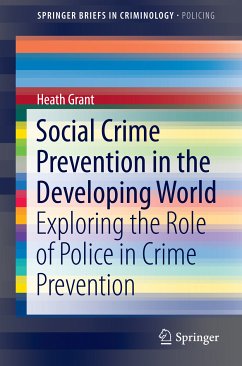
Trust and Legitimacy in Criminal Justice (eBook, PDF)
European Perspectives
Redaktion: Mesko, Gorazd; Tankebe, Justice
Versandkostenfrei!
Sofort per Download lieferbar
72,95 €
inkl. MwSt.
Weitere Ausgaben:

PAYBACK Punkte
36 °P sammeln!
The book explores police legitimacy and crime control, with a focus on the European region. Using comparative case studies, the contributions to this timely volume examine the effects of a transition to democracy on policing, public attitudes towards police legitimacy, and the ways in which perceptions of police legitimacy relate to compliance with the law.Following these case studies, the authors provide recommendations for improving police legitimacy and controlling crime, in these particular sociopolitical environments, where the police are often associated with previous military or paramil...
The book explores police legitimacy and crime control, with a focus on the European region. Using comparative case studies, the contributions to this timely volume examine the effects of a transition to democracy on policing, public attitudes towards police legitimacy, and the ways in which perceptions of police legitimacy relate to compliance with the law.
Following these case studies, the authors provide recommendations for improving police legitimacy and controlling crime, in these particular sociopolitical environments, where the police are often associated with previous military or paramilitary roles. The techniques used by these researchers may be applied to studies for policing in other regions, with potential applications within Europe and beyond. Chapters present topical issues of crime, crime control and human emotions regarding crime, criminals, law enforcement and punishment in contemporary societies.
This book will be of interest to researchers in criminology and criminal justice, as well as political science and public policy.
This book is highly recommended for anyone interested in procedural justice and legitimacy, encounters between citizens and the state, the effectiveness of governmental institutions, and democratic development. It stands alone in its broad, cross-national contributions to understanding these issues.
-Wesley G. Skogan, PhD, Professor of Political Science, Northwestern University, Chicago, IL, USA
Following these case studies, the authors provide recommendations for improving police legitimacy and controlling crime, in these particular sociopolitical environments, where the police are often associated with previous military or paramilitary roles. The techniques used by these researchers may be applied to studies for policing in other regions, with potential applications within Europe and beyond. Chapters present topical issues of crime, crime control and human emotions regarding crime, criminals, law enforcement and punishment in contemporary societies.
This book will be of interest to researchers in criminology and criminal justice, as well as political science and public policy.
This book is highly recommended for anyone interested in procedural justice and legitimacy, encounters between citizens and the state, the effectiveness of governmental institutions, and democratic development. It stands alone in its broad, cross-national contributions to understanding these issues.
-Wesley G. Skogan, PhD, Professor of Political Science, Northwestern University, Chicago, IL, USA
Dieser Download kann aus rechtlichen Gründen nur mit Rechnungsadresse in A, B, BG, CY, CZ, D, DK, EW, E, FIN, F, GR, HR, H, IRL, I, LT, L, LR, M, NL, PL, P, R, S, SLO, SK ausgeliefert werden.












